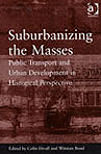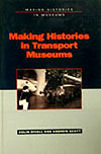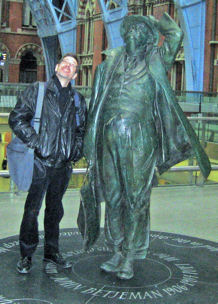Colin Divall
Professor Emeritus of Railway Studies
Visit Colin Divall's profile on the York Research Database to:
- See a full list of publications
- Browse activities and projects
- Explore connections, collaborators, related work and more
Profile
Biography
BSc (Bristol), MSc, PhD (Manchester), FRHistS
Colin Divall’s main research interests are in the history of transport and mobility, the history of technology (particularly in the nineteenth and twentieth centuries), and the public histories of both of these fields.
Colin is a member of the editorial board of the International Journal for the History of Engineering and Technology and was on the board of the Journal of Transport History from 1997 to 2015. He was until recently a contributing editor of Technology and Culture and until 2013 a Vice President of the International Association for the History of Transport, Traffic and Mobility (T2M).
He is a member of the Institute of Railway Studies, run jointly with the National Railway Museum, and also of the School for Business and Society's Centre for Evolution of Global Business and Institutions.
Research
Overview

Colin’s research focuses on the history of transport and mobility, with an emphasis on the late nineteenth and twentieth centuries; the social history of engineering and technology; and the ways in which the public engages with these aspects of the past through institutions such as museums and heritage sites.

He recently ran a large AHRC-funded project on the marketing techniques developed by Britain’s railways between 1870 and 1975, looking at how the private companies and then the nationalized industry encouraged people to travel by train. More generally, he is interested in how the long history of our attitudes towards mobility might inform the development of policies and practices aimed at ecologically and socially sustainable forms of transport.
Colin is not available to supervise new research students.
Resources available for research students in York
Search Engine, the National Railway Museum’s extensive library and archive, offers superb facilities for studying British and many overseas railways in the nineteenth and twentieth centuries; the Museum’s collections are also of great value to historians whose primary interest is not transport. There are strong holdings in the history of transport and mobility at the JB Morrell and Minster Libraries; the University and Museum’s library catalogues are fully integrated. Further afield, the National Tramway Museum, located at Crich in Derbyshire, has a world-class collection of library and archival material relating to the history of urban transport and planning in Britain and overseas.
Supervision
Recently supervised research degrees include:
- ‘“Of Pious Memory”: Railway Regulatory Tribunals in the UK, 1854-1939’ (Simon Gibbs, PhD, 2014)
- ‘Managing the “Royal Road”: the London & South Western Railway 1870-1911’ (David Turner, PhD, 2014).
- ‘“A Master Whose Heart is in the Land”: Picturing the Tourist Utopia of the Great Western Railway, 1897-1947’ (Matt Thompson, PhD, 2012)
- ‘Picturing the Railway Passenger as Customer in Britain: the Great Western Railway, 1906-1939’ (Alex Medcalf, PhD, 2012)
- ‘Brazilian Railway Culture’ (Martin Cooper, PhD, 2009).
- ‘Forging Iron Horse and Iron Men: Rail Transport in the Korean War and the Influence of US Army Transportation Corps on the Development of the Korean National Railroad’ (Eric Sibul, PhD, 2009).
- ‘Strategy, Solvency and the State: the Development of the Railway System of Northern Scotland, 1844-74’ (Peter Fletcher, PhD, 2007).
- ‘Landowners and railways in Norfolk, 1840-70’ (the late Peter Batley, MPhil, 2007). ‘Municipal Politics and Regional Monopoly: Railways and the Port of Hull, 1840-1922’ (Keith Nolan, PhD, 2006).
- ‘“Dead on the Point of Safety”: Occupational Safety Education on the Great Western Railway, 1913-39’ (Michael Esbester, PhD, 2006).
Current doctoral projects include:
- The Southern Railway’s policy and practice in relation to buses (Reg Davies).
- The architecture of the tunnel on the UK's railways (Hubert Pragnell).
- The transition from carriers to railways in the development of distribution in the UK, ca 1750-1850 (Carolyn Dougherty).
- The patent system and English railway technology during the Industrial Revolution, 1750-1852 (Stephen Murfitt)
- Fragmentation and knowledge management on Britain’s privatized railways (Nicky Forsdike; jointly with York Management School)
- Food miles: the imaginings, politics and practices of food distribution in the UK, ca 1920-1975 (Thomas Spain) (AHRC CDA with the National Railway Museum)
- The Chester and Holyhead Railway: the first imperial railway? (Phil Lloyd)
- The Pullman Car Company’s contribution to innovation and technique, comfort and safety, ca 1920-1963. (Antony Ford)


